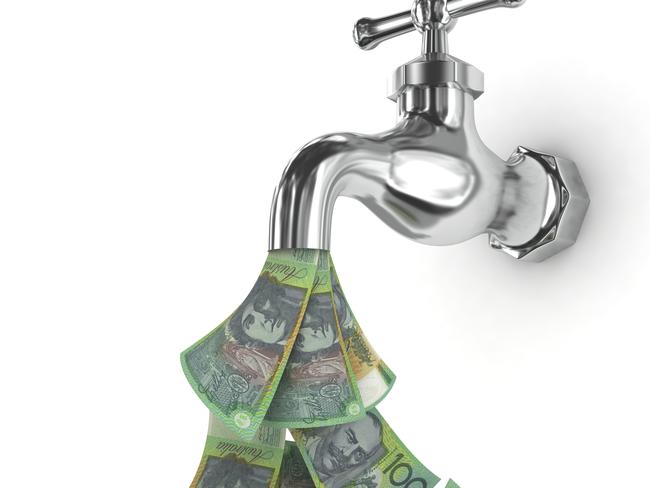How to avoid running out of money in retirement
Lower super fees, government incentives and investments are just some ways to keep the cash tap flowing once you retire.

RUNNING out of money in retirement is an increasing worry as older Australians live longer and spend more.
When work stops, the wage income tap gets turned off — usually permanently — so preserving your income becomes vital.
Club Plus Super chief executive Paul Cahill says today’s retirees are generally divided into two camps: those with enough money that they never have to worry about it, or those with very little who rely mainly on the age pension.
“What you will find in the next 20 years is instead of people with too little, more will move into the middle ground where they have enough but it’s not enough to be super-comfortable,” he says.
While the best way to avoid running out of money is to save more before you retire, here are seven ways to manage finite cash resources in your golden years.
1. BUDGET OR SUFFER
Budgets may seem boring, but retirement is the time to watch your spending more closely.
Wealth for Life Financial Planning principal Rex Whitford says people generally spend 20 per cent more than they think they do.
“It’s never how much you have — it’s how much you spend,” he says. “In retirement your income changes and you need to do a budget — it’s pretty basic stuff. You can’t be as flippant with your money.”
Search online for “budget tools” and you’ll find a heap of them.
2. THINK AHEAD
Hand-in-hand with a budget should be a written outline of your future expenses, and not just short-term ones. Home renovations, new cars, downsizing to a smaller home and family needs should all feature in your planning.
“Down the track there may be a need to fund aged care,” Whitford says.
3. EXTRA INCENTIVES
Cahill says even if retirees do not qualify for an age pension, they can often take advantage of other government incentives including cheaper medicines, travel concessions, reduced council rates and water bill reductions.
“If you get enough of these bundled up you can save quite a bit of money,” he says.

4. FIGHT FEES
Superannuation fees typically account for about 1 per cent of your annual investment returns, but expensive funds or advisers will charge 2 or 3 per cent. Make sure you’re not being ripped off.
“Fees erode large balances quickly. It’s the reverse engineering of compound interest — high fees take a high balance down much quicker,” Cahill says.
5. GROWTH IS GOOD
Cahill says growth assets such as shares and property help many people build a big nest egg but once they retire they feel they should only stick with conservative cash investments. “If you invest in cash and term deposits only your money will run out pretty quickly,” he says.
Whitford says growth assets are needed — at least in the early years of retirement — as a shield against the effects of inflation.
6. JUST SAY NO
Younger generations may see retirees as a cash tap, but your money will quickly disappear if you give it away without thinking about your own needs, Whitford says.
“You may need to learn how to say no more diplomatically on more occasions,” he says.
“We all want to shower our grandchildren with gifts, and that can get a bit ugly when you are competing with other grandparents. You might not want to buy into it.”
7. BACK TO WORK?
Older Australians are more active than ever, and for some taking on part-time work may be a solution that stimulates the mind and delivers extra cash. Centrelink incentives such as the Work Bonus mean many retirees can earn handy income without affecting their pension.
Cahill says work is good for the soul. “We find a lot of people retire and come back 12 months later and say ‘I’m bored as hell, I’ve got to do something’,” he says.



